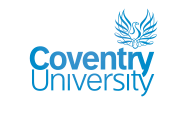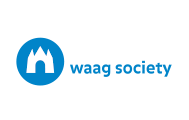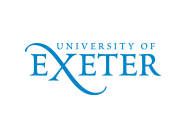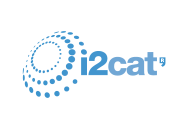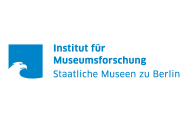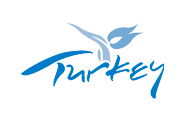

This project has received funding from the European Union’s Seventh Framework Programme for research, technological development and demonstration under grant agreement no 612789

SECOND NETWORKING SESSION
Below is a description of the projects that participated in the Second Networking Session for EC projects, organised by RICHES in the framework of the Second Policy Seminar (Brussels, 23 May 2016).
Visit the projects' Digital Poster Exhibition.
Download the presentations of the networking session.
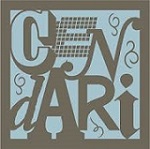 CENDARI
CENDARI
The Collaborative European Digital Archival Research Infrastructure is a 4-year, European Commission-funded project which integrates digital archives and resources for the pilot areas of medieval culture and the First World War. The aim of CENDARI is to pilot the implementation of a virtual research infrastructure which will allow scholars to access historical resources across institutional and national boundaries. At the core of the CENDARI environment are federated archival resources from more than a thousand institutions across Europe and the world. The project brings information and computer scientists together with leading historians and existing historical research infrastructures (archives, libraries and other digital projects) to improve the conditions for historical scholarship in Europe, through active response to the impact of the digital age on scholarly and archival practice.
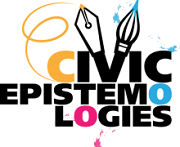 Civic Epistemologies
Civic Epistemologies
The CIVIC EPISTEMOLOGIES – Development of a Roadmap for Citizen Researchers in the Digital Culture project is about the participation of citizens in research on cultural heritage and humanities. ICT are powerful drivers of creativity, but specific technical know-how is still generally lacking in the creative industries sectors. In addition, humanities scholarship is not yet taking full advantage of ICT to engage with wider audiences. New skills are needed to enable the cultural sector to grasp employment and commercial opportunities. The project aims to develop and validate a Roadmap for the use of e-Infrastructures to support the participation of European citizens in research on cultural heritage and digital humanities. Critically, the Roadmap will offer support for improved social cohesion arising from the sharing of knowledge and understanding of Europe’s citizens common and individual cultures.
Web: http://www.civic-epistemologies.eu/
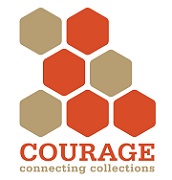 COURAGE
COURAGE
COURAGE (“Cultural Opposition –Understanding the CultuRal HeritAGE of Dissent in the Former Socialist Countries”) project will create the first digital database of both online and offline private and public collections in Europe which testify to the survival of various forms of cultural opposition in the former socialist countries; these collections cover a period from the rise of communist regimes in the region to the fall of the Iron Curtain. COURAGE will further a more nuanced understanding of how these collections work, what functions they serve in their respective societies, and how they represent their holdings and findings to the national and international public. The general aim of this analysis is to allow for the expanded outreach and increased impact of the collections by assessing the historical origins and legacies of various forms of cultural opposition.
Web: http://www.cultural-opposition.eu/
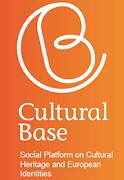 CulturalBase
CulturalBase
Cultural Base – Social Platform on Cultural Heritage and European Identities is a social platform funded by the European Commission's Horizon 2020 Framework Programme 2014-2015 “Europe in a changing world: inclusive, innovative and reflective societies”. Cultural Base aims to address the topic of Heritage and European Identities from a double standpoint, namely, an analytical as well as a public policy perspective. It all began with the idea that since the second half of the last century, culture has experienced a profound mutation, through which its position and role in the social dynamics have been transformed. Culture now constitutes an essential basis of today’s society in a context of cultural digitization and globalization. The transformation of the entire cultural ecosystem has radically altered - and at the same time, intensified - the relationship between cultural identity, cultural heritage and cultural expression. This transformation has occurred both at the level of the professional cultural sector as well as in society as a whole. As a Social Platform, Cultural Base aims at exploring the new challenges and the new potential of culture, where three pillars - cultural identity, cultural heritage and cultural expression – intertwine combining the knowledge stemming from academic and non-academic worlds. The work of the Cultural Base platform will be conducted along three main axes: 1) Cultural memory, 2) Cultural inclusion, and 3) Cultural creativity.
Web: http://www.culturalbase.eu/
Europeana Space Project
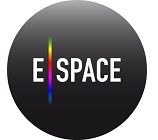 Europeana Space aims to increase and enhance the creative industries’ use of digital cultural content and Europeana by delivering a range of resources to support their engagement. The use of content is still limited by factors including the issue of IPR status and the need for robust business models that demonstrate the potential for exploitation of available content. In addressing these problems, Europeana Space brings together high-level expertise from the European creative industries, technology-based enterprises, the cultural heritage sector and higher education. Europeana Space will create new opportunities for employment and economic growth within the creative industries based upon Europe’s rich digital cultural resources. It will provide an open environment for the development of applications and services based upon digital cultural content. The use of this environment will be fostered by a wide programme of promotion, dissemination and replication of the Best Practices developed within the project.
Europeana Space aims to increase and enhance the creative industries’ use of digital cultural content and Europeana by delivering a range of resources to support their engagement. The use of content is still limited by factors including the issue of IPR status and the need for robust business models that demonstrate the potential for exploitation of available content. In addressing these problems, Europeana Space brings together high-level expertise from the European creative industries, technology-based enterprises, the cultural heritage sector and higher education. Europeana Space will create new opportunities for employment and economic growth within the creative industries based upon Europe’s rich digital cultural resources. It will provide an open environment for the development of applications and services based upon digital cultural content. The use of this environment will be fostered by a wide programme of promotion, dissemination and replication of the Best Practices developed within the project.
Web: http://www.europeana-space.eu/
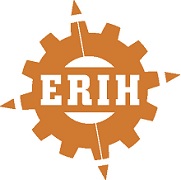 ERIH
ERIH
ERIH – European Route of Industrial Heritage is the European industrial heritage tourism information network. Currently it presents about 1,200 sites in 43 European countries. Among these sites there are more than 80 Anchor Points which build the virtual ERIH main route. On eighteen Regional Routes it is possible to discover the industrial history of these landscapes in detail. All sites relate to thirteen European Theme Routes which show the diversity of European industrial history and their common roots.
Web: http://www.erih.net/
 EUscreen Foundation
EUscreen Foundation
The EUscreen Foundation represents the EUscreen network. The EUscreen network operates: a website with highlights from audiovisual (mainly television) collections from across Europe through a range of interactive features; an infrastructure to connect audiovisual archives to Europeana and VIEW, Journal of European Television History and Culture. The recently redesigned portal, connected to the Europeana ecosystem, grants additional or, for some of our network members, unique online presence. Also, EUscreen is the point of reference regarding audiovisual heritage access policy and, through hosting events and diversified professional profiles of the member institutions, a platform for knowledge exchange. To date EUscreen is the world's largest community operating an infrastructure for universal access to audiovisual heritage. EUscreen defines it's mission as being an independent, inclusive network, supporting durable and contextualised access to Europe’s television heritage. It actively promotes awareness of audiovisual heritage in various domains, including education, research, media production and towards the general public.
 HERA
HERA
HERA – Humanities in the European Research Area is a consortium of 24 European Humanities Research Councils across Europe and the European Commission, with the objective of firmly establishing the humanities in the European Research Area and in the European Commission Framework Programmes. Since 2009 it has funded 37 multi-national projects in areas including cultural heritage, with 35m euro total. 20+ new projects to begin 2016 (21 m euro total).
HERA participates to the RICHES networking session with representatives of the new projects funded under HERA JRP Cultural Encounters & Uses of the Past.
Web: http://heranet.info/
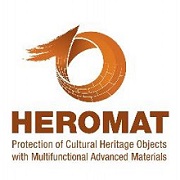 HEROMAT
HEROMAT
The FP7 multidisciplinary research cooperation project HEROMAT – Protection of Cultural Heritage objects with multifunctional advanced materials was directed towards the development of innovative environmental friendly materials with value added functions aimed to the protection of immovable Cultural Heritage assets. It contributed to an effective, long-lasting solutions for the prevention of degradation, keeping the authenticity, functionality and the aesthetic appearance of the cultural assets and having socio-economic benefits. The Pan-European HEROMAT team from Serbia, Slovenia, Italy, UK and Russia, focused on the restoration and consolidation of two case study historical objects located in urban (Bač fortress, Serbia) and rural (Manor in Dornava, Slovenia) environment, both having continental climate. The HEROMAT project investigation involved the chain of activities from the synthesis, establishment of the methodology for characterization and testing of novel protective materials through their pilot production and, finally, to the in situ application and monitoring, giving also their life cycle assessment. The output of HEROMAT is a set of novel materials applicable for the protection of different inorganic mineral substrates providing multiple added functions: consolidation, self-cleaning and anti-microbial effect.
I-MEDIA-CITIES
I-Media-Cities is the initiative of 9 European Film Libraries, 5 research institutions, 2 technological providers and a specialist of digital business models to share access to and valorise audiovisual (AV) content from their collections for research purposes in a wide range of social sciences (sociology, anthropology, urban planning, etc). The project revolves around cities in European history and identity. A huge quantity of fictional and non-fictional AV works (from the end of the 19th century onwards) in their collections describe cities in all aspects, including physical transformation and social dynamics. Such material could prove of enormous value to scholars in different fields of study. I-Media-Cities plans integration and technical development work to push interoperability among 9 archives and generate two types of e-environments to be used by researchers and innovators for research and other creative purposes. This will allow new approaches to research in social sciences and unleash creativity, in new forms of delivery and consumption of that content which the creative industry would be able to propose for instance in tourism or in the cultural economy.
Web: not yet available
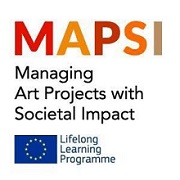 MAPSI
MAPSI
MAPSI – Managing Art Projects with Societal Impact is a LLP Erasmus Multilateral Project which refers to a specialization in management of artistic projects with societal impact, and aims to create an international network focusing on educating cultural managers and facilitators to manage and mediate artistic and cultural projects with societal impact. It will integrate the transnational and interdisciplinary fields of art, management and societal impact by developing a novel understanding on the interaction between art and society and increasing the skills and competences of future cultural managers to foster the valuable interface.
Web: http://www.mapsi.eu/
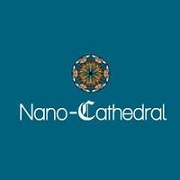 Nano-Cathedral
Nano-Cathedral
The objective of Nano-Cathedral – Nanomaterials for conservation of European architectural heritage developed by research on characteristic lithotypes is to provide “key tools” for restoration and conservation. Five different cathedrals were selected as they may be considered as representative of both different exposure conditions and different types of stones. A general protocol will be defined for the identification of the petrographic and mineralogical features of the stone materials, the identification of the degradation patterns, the evaluation of the causes and mechanisms of alteration and degradation, including the correlations between the relevant state of decay and the actual microclimatic and air pollution conditions.
Web: http://www.nanocathedral.eu/
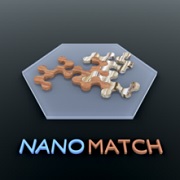 NanomatCH
NanomatCH
NANOMATCH – Nano-systems for the conservation of immoveable and moveable polymaterial Cultural Heritage in a changing environment is based on the development of two metal-alkoxide consolidants: calcium based as strengthener for stone and as alkaline supply for wood, and aluminium based as consolidant for glass. The challenge is to produce new, advanced, compatible and sustainable nano-structured materials, tailored to the conservation needs of the different substrates, in particular porous calcareous stones, wood deteriorated by acidic conditions, micro-fractured stained glass. The idea behind NANOMATCH is to refresh the conventional conservation market. These products will be cost-effective and simple to apply. They mark a new generation of restoring and protecting products, compatible with the original materials, applicable to indoor and outdoor Cultural Heritage. This will improve measures for the protection of Europe’s valuable heritage.
Web: http://www.nanomatch-project.eu/
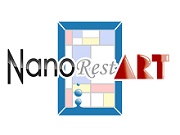 NANORESTART
NANORESTART
The NANORESTART – NANOmaterials for the REStoration of works of ART project focuses on the synthesis of novel poly-functional nanomaterials and on the development of highly innovative restoration techniques to address the conservation of a wide variety of materials mainly used by modern and contemporary artists. In NANORESTART, enterprises and academic centers of excellence in the field of synthesis and characterization of nano- and advanced materials have joined forces with complementary conservation institutions and freelance restorers. This multidisciplinary approach will cover the development of different materials in response to real conservation needs, the testing of such materials, the assessment of their environmental impact, and their industrial scalability.
Web: http://www.nanorestart.eu/
 Photoconsortium Association
Photoconsortium Association
PHOTOCONSORTIUM – International Consortium for Photographic Heritage is a non for profit association whose purpose is the promotion and enhancement of the culture of photography and the photographic heritage. To achieve its statutory goals, PHOTOCONSORTIUM aims to promote, organize and manage conferences, exhibitions, awards and training courses as well as to carry out publishing activities. The association participates, and promotes the participation of its members, in new projects and initiatives also in collaboration with third parties, including but not limited to participation in the Programmes of the European Commission. All the initiatives of the association are primarily devoted to serving the interests of its members.
Web: http://www.photoconsortium.net/
SIGN-HUB
SIGN-HUB aims to provide the first comprehensive response to the societal and scientific challenge resulting from generalized neglect of the cultural and linguistic identity of signing Deaf communities in Europe. It will provide an innovative and inclusive resource hub for the linguistic, historical and cultural documentation of the Deaf communities' heritage and for sign language assessment in clinical intervention and school settings. To this end, it will create an open state-of-the-art digital platform with customized accessible interfaces. The project will initially feed that platform with core content in the following domains, expandable in the future to other sign languages: (i) digital grammars of 6 sign languages, produced with a new online grammar writing tool; (ii) an interactive digital atlas of linguistic structures of the world's sign languages; (iii) online sign language assessment instruments for education and clinical intervention, and (iv) the first digital archive of life narratives by elderly signers, subtitled and partially annotated for linguistic properties. These components, made available for the first time through a centralized platform to specialists and to the general public, will (a) help explore and value the identity and the cultural, historical and linguistic assets of Deaf signing communities, (b) advance linguistic knowledge on the natural languages of the Deaf and (c) impact on the diagnosis of language deficits within these minorities.
Web: not yet available
 Voices of Culture
Voices of Culture
Voices of Culture ‒ Structured Dialogue between the European Commission and the cultural sector provides a framework for discussions between EU civil society stakeholders and the European Commission with regard to culture. It aims to strengthen the advocacy capacity of the cultural sector in policy debates on culture at European level, while encouraging it to work in a more collaborative way. Voices of Culture will focus on five themes until the end of 2016. Two themes, 'Audience Development via Digital Means' and 'Participatory Governance of Cultural Heritage', were discussed in June and July 2015. Two themes, “Developing The Entrepreneurial And Innovation Potential Of The Cultural And Creative Sectors” and “Promoting Intercultural Dialogue And Bringing Communities Together Through Culture In Shared Public Spaces” will be discussed in February and March 2016. For the last and fifth theme, stakeholders had the opportunity to choose which theme should be discussed: “the Role of Culture in Promoting the Integration of Refugees and Migrants”. The theme will be discussed in June 2016.
Official Media Partner: Digital Meets Culture.
Designed and powered by: Promoter SRL.
